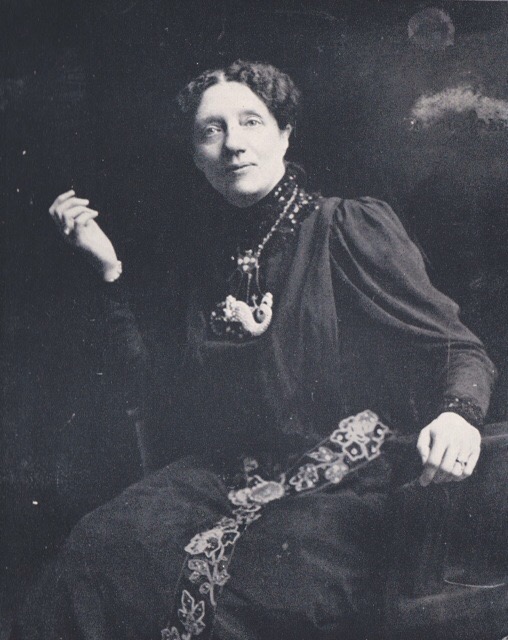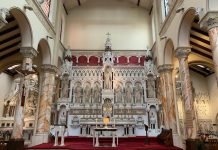Many argue that The British repertory theatre movement began in Manchester in 1908 and the women Behring was Annie Horniman.
Using £25,000 of her family’s packet tea fortune, she bought Manchester’s Gaiety Theatre, with the intenton of bringing classics and new locally written plays to working class audiences.
Annie was not a native of the city, born Annie Elizabeth Fredericka in 1860 in Forest Hill, London, her grandfather was a grocer who had come up with the idea of selling pre-packaged tea, and launching a firm that by the 1890’s was considered the biggest tea trader in the world.
Her father Frederick joined the family firm later becoming Liberal MP for Penryn and Falmouth.
The young Annie had a comfortable middle class upbringing albeit in a strict Quaker household.
The Large detached Victorian villa, set in fifteen acres in Forest Hill would be where she was educated by her governess and from where at the age of fourteen, Annie and her younger brother, Emslie, were taken to a performance of The Merchant of Venice at The Crystal Palace, sparking off a lifelong love of the theatre.
In 1882 she and Emslie began studying at the Slade School of Art, founded just ten year’s previously and one of the few institutions that admitted women at the time.
It sparked what would today be best termed a bohemian streak in Annie, regularly travelling abroad, visiting Paris to view the work of the Impressionists, and attending the Bayreuth Festival in Germany where she became aware of the German subsidised theatre scene and its cultural importance.
Returning home, she joined the Independent Theatre Society and this led to her becoming a pioneer of the modern repertory theatre movement.
She also joined and helped finance an occult society, the Hermetic Order of the Golden Dawn, whose members would include Aleister Crowley, Bram Stoker, and William Butler Yeats.
With money inherited from her grandfather she funded a season at the Avenue Theatre in London which would include the first public production of Arms and the Man by George Bernard Shaw and W.B. Yeats’ first play in London: The Land of Heart’s Desire.
Although the venture was deemed a critical success it wa a financial disaster bit would lead to a fruitful relationship with Yeats working as his unpaid secretary and making the costumes for a play of his performed at the Abbey Theatre in Dublin, a theatre set up by Yeats as a home for the Irish National Theatre.
She financed permanent home for the theatre which opened in 1904 with plays by Yeats and Lady Augusta Gregory and quickly established for itself an international reputation for championing new Irish plays and a high standard of acting.
It was that model that she brought to Manchester four years later using more inherited money, this time from her father, buying the Gaiety Theatre and opening it as the first modern repertory theatre.
She hired the noted theatre architect, Frank Matcham to completely refurbish the Gaiety with excellent sightlines, good acoustics and the latest comfortable tip-up seats.
It revolutionised theatre going for the city, bringing for the first time the working classes into contact with works ranging from Euripides to George Bernard Shaw.
Bolton mill girl and trade unionist Alice Foley described the joy of a Gaiety matinée in her autobiography, A Bolton Childhood: “Over tea, brown bread, peaches and cream, we animatedly argued and discussed the philosophy, art or satire of the productions.
“The whole outing cost about five shillings each, but we returned home like exultant young gods, tingling and athirst with the naïve faith that if only sufficient human beings could witness good drama and comedy it might change the world.”
But while it was critical acclaimed, fiercely supported by the Manchester Guardian and spurning the so called Manchester School of playwrights (Harold Brighouse of ‘Hobson’s Choice’ fame and Stanley Houghton, the writer of Hindle Wakes. Actors and directors like Sybil Thorndike and Basil Dean got their first break at The Gaiety.), it was a financial disaster.
The First World War sowed the seeds of its decline as audience numbers fell and in 1917, Annie sold up.
The Gaiety continued for four more years but succumbed to the new medium of cinema in 1921.
That year Annie left Manchester for good, returning to London and never actively participating in the theatre again.
She died in 1937 at the age of seventy six, George Bernard Shaw declaring that she should be buried in Westminster Abbey.
Her legacy being that she started the modern theatre movement in Manchester but also discovering as is still the case today, that without subsidy it will struggle to survive.







